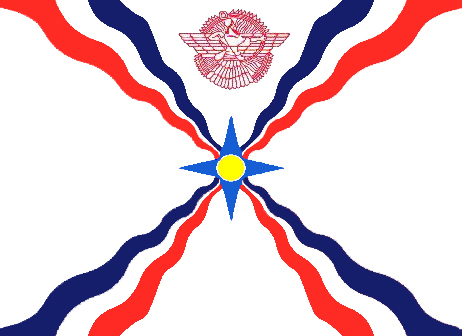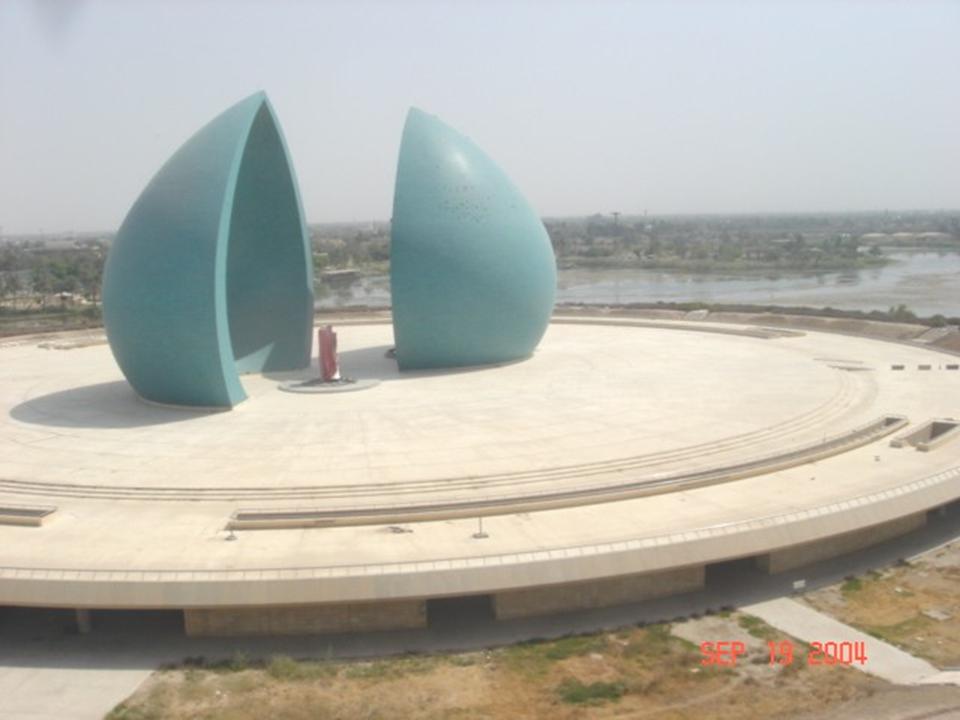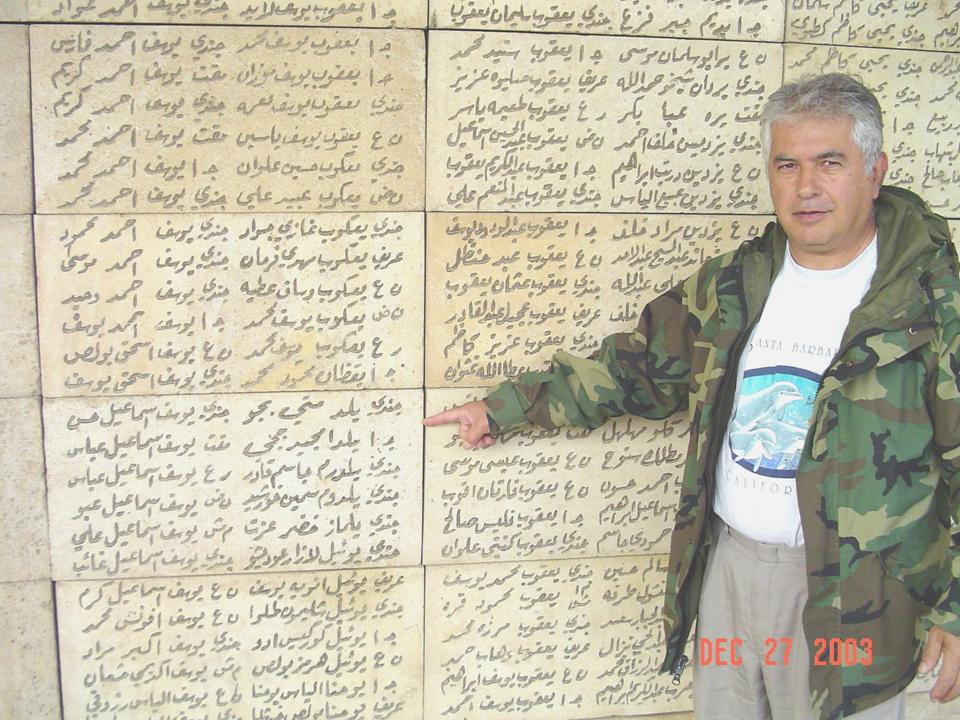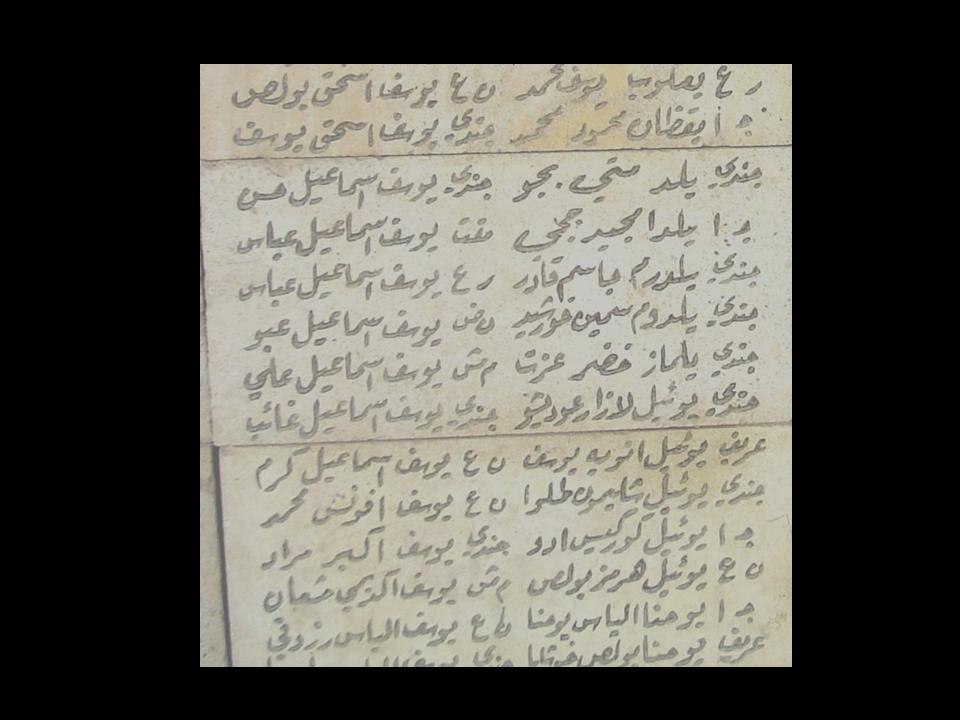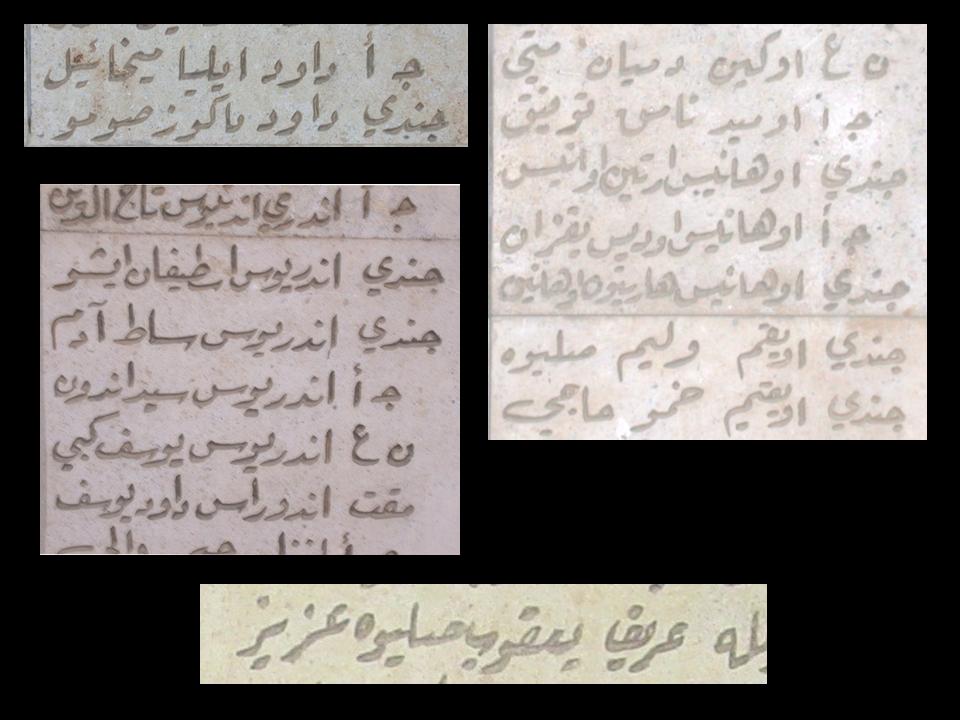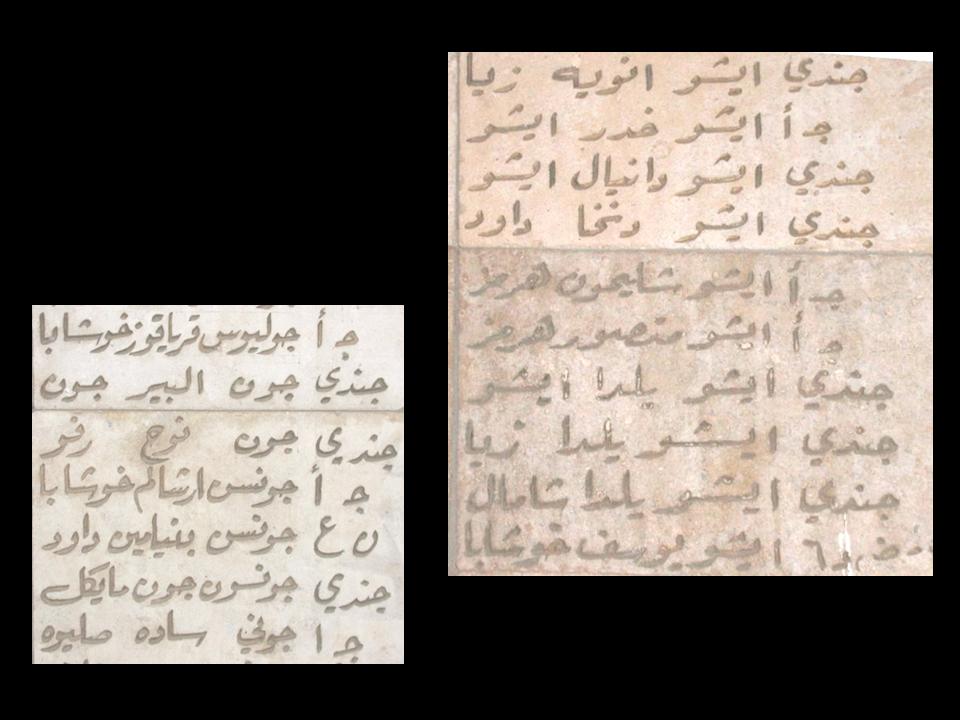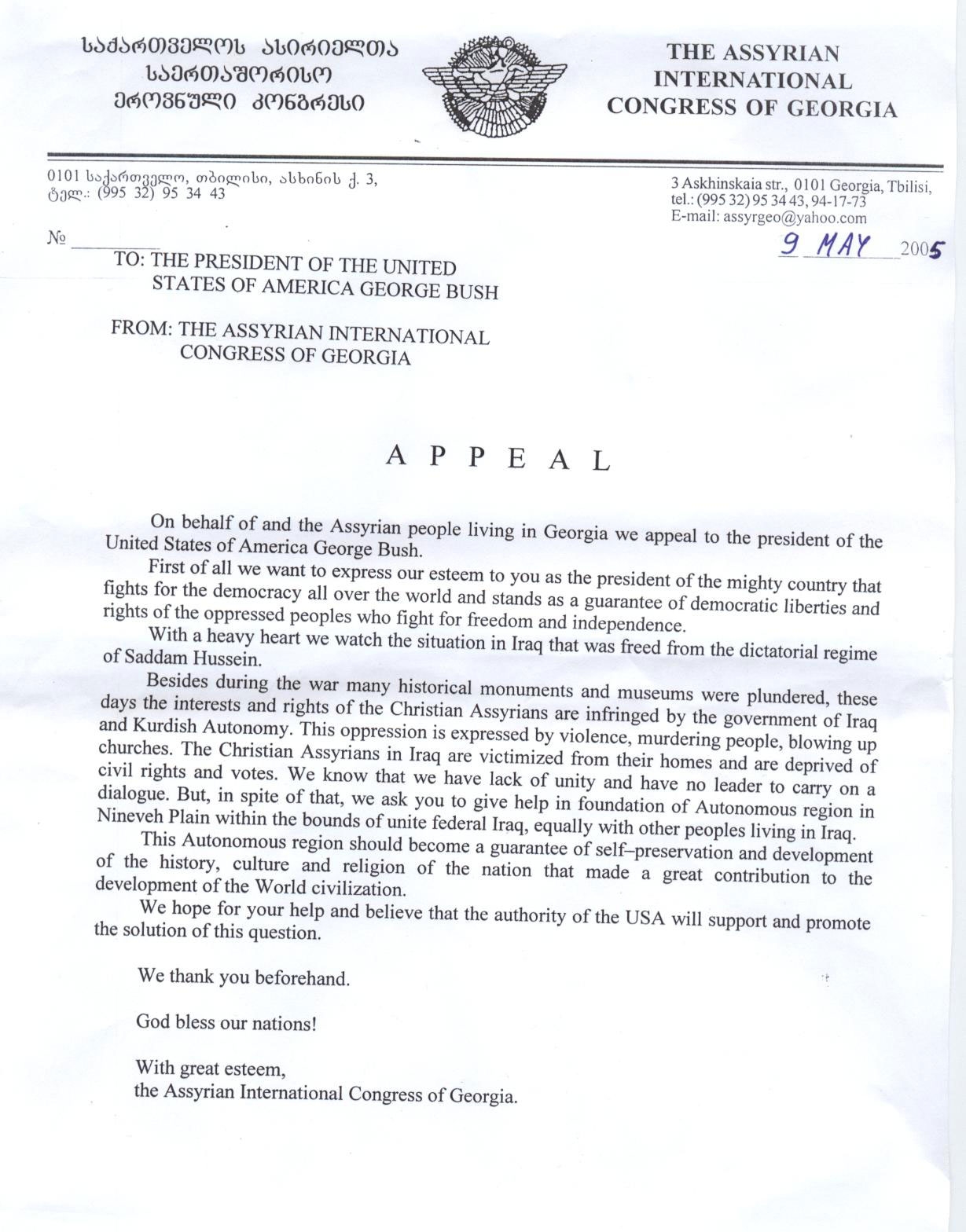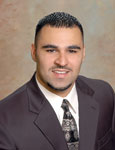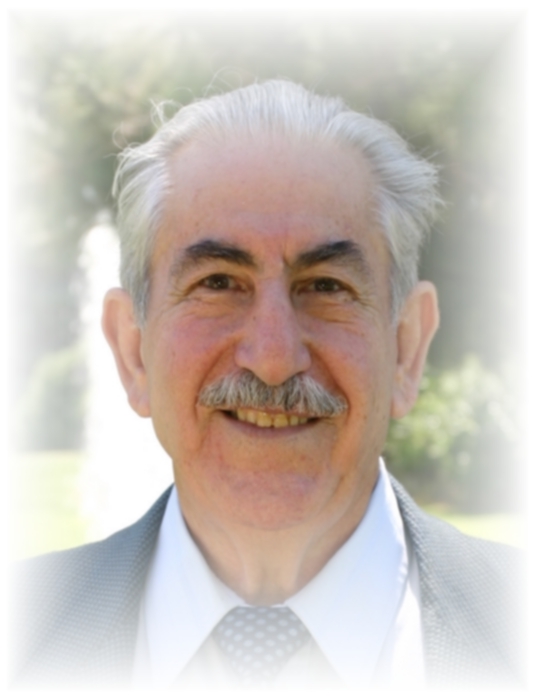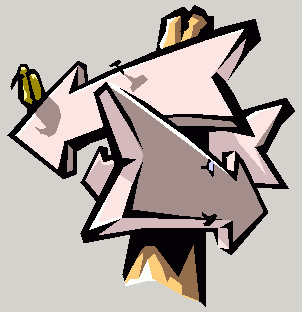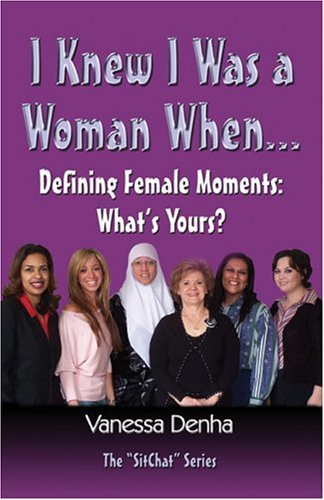Mar Delly Visits France, President Chirac
Courtesy of Reuters & the Anglican Communion
(ZNDA: Paris) His Beatitude, Emmanuel III Delly, Patriarch of the Chaldean Catholic Church in Iraq, visited the Cathedral of the Holy Trinity, Paris, France, where the Solemn Evensong was sung in his honor. The Patriarch's visit to the Cathedral is part of his ongoing visit to France, where an estimated 16,000 Chaldeans make their home. The Right Reverend Pierre Whalon, who is among those facilitating the Patriarch's visit to France, noted that the purpose of the trip was both religious and diplomatic. While visiting France, His Beatitude will ordain three deacons at the Chaldean parish of St Thomas the Apostle in Sarcelles, a suburb of Paris.
On the afternoon of May 16, the Patriarch met with President Jacques Chirac to share his perspective on the evolving circumstances in his country since the fall of Saddam Hussein.
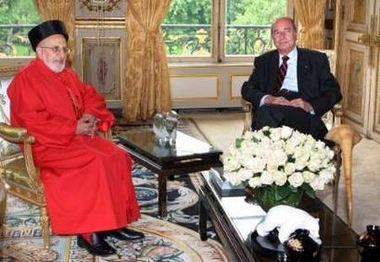 |
French President Jacques Chirac (R) meets with the Patriarch of the Chaldean Catholic Church, His Beatitude Mar Emmanuel III Delly at the Elysee Palace in Paris on 16 May. Photo by Reuters/Jacques Brinon/Pool. |
The Dean of the Cathedral, the Very Rev. Zachary Fleetwood, officiated at the vesper service in the packed church. Dean Fleetwood in his opening remarks welcomed the Patriarch and other invited guests, including leaders of the French Catholic, Orthodox, Coptic, Reformed, and Lutheran churches, and representatives of the American Embassy and the French Ministry of Foreign Affairs.
In his homily given in English and French, Bishop Whalon began by conveying to Emmanuel III the greetings and prayers of the Archbishop of Canterbury, the Most. Rev. & Rt. Hon. Rowan Williams. He also read a letter of welcome from Presiding Bishop Frank Griswold of the Episcopal Church. Bishop Whalon then thanked the Patriarch for welcoming him to Baghdad in February 2003, just before the conflict there began. Bishop Whalon had expressed there the opposition of the Episcopal Church and the Anglican Communion to a war, and at the Patriarch's invitation, led an ecumenical service for peace.
Whalon commented that he was changed by his trip to Iraq. The experience made him more aware of the ancient churches of the Orient, of which he had been previously ignorant. He expressed his hope that Americans and French people (Whalon is a citizen of both countries) will become more and more aware of the Churches in Iraq. 'The more we know of Iraqi Christians, the better we will remember you and our duty toward you and all Iraqi Christians.'
Quoting Bishop Griswold, Whalon underlined to the Patriarch the "deep pain" felt by Griswold and all Episcopalians for "your suffering in the aftermath of our nation's attack, which we did everything to try to prevent." He called upon "all people of good will" now to support the new democracy being born in Iraq, saying that religious tolerance was necessary not only for the survival of Iraqi Christians, but indeed all Iraqis. "It is therefore imperative that we all support this new democracy," said Whalon, "it is our duty." He concluded by expressing to the Patriarch his hope that they could meet again "on the banks of the Tigris, where there will be peace."
A formal reception followed for Emmanuel III, who in his remarks thanked Bishop Whalon and Dean Fleetwood for their warm welcome, and especially for the sincere expression of support and care for the Chaldeans and all Iraqi Christians. The Patriarch said that their plight extends to all humanity, for we all deeply desire to live in peace. He received a gift of a leather-bound French-English Book of Common Prayer, one of four bilingual texts published by the Convocation of American Churches in Europe. The Patriarch gave his benediction to the packed parish hall before departing.
Saadi Speaks on Political Reforms in Syria
 Zinda: The following is the full text of Mr. Bachir Isaac Saadi's speech delivered on 6 May 2005 in al-Hassak on the subject of political reforms in Syria. Mr. Saadi is the chairman of the Assyrian Democratic Organization (Takasta)'s Political Bureau.
Zinda: The following is the full text of Mr. Bachir Isaac Saadi's speech delivered on 6 May 2005 in al-Hassak on the subject of political reforms in Syria. Mr. Saadi is the chairman of the Assyrian Democratic Organization (Takasta)'s Political Bureau.
In the beginning I would like to thank those who organized this meeting in this very sensitive period of our country’s history, a time which requires from all the parties alertness and carefulness as regards the steps taken, the assessments of the events taking place around us, as well as the visions of how our county's future would be.
Needless to say that the area in general and Syrian in particular is going through a very delicate and dangerous phase. We hear and see what is happening everyday in Iraq and Lebanon, as well as the threats against Syria from the American administration, the plans being prepared in the Congress for “the liberation of Syria “ and the law of “considering the Baath party as a terrorist organization“. All these are extremely serious developments that would affect not only the regime in Syria but the majority of the Syrian people. Misfortunes such as this, do not differentiate between an ordinary citizen or state officials, besides, we are convinced that the public and political picture in Iraq is more or less similar to that in Syria. Hence, the serious question about our future springs up: What are the plans prepared for Syria in the Western circles ? How are we going to deal with them? And what is the role of the patriotic forces outside the Patriotic Progressive Front? Is the regime going to handle this crisis without involving the active forces in the society? Are we going to wait for the promised changes following the 10th convention of the Baath party? No one, so far, has been able to answer any of these questions.
America is convinced now that the antagonism against her and the West comes from the totalitarian regimes, whether religious or nationalistic, that is why she is pressuring the Arab countries to introduce democratic changes, assuming that these changes would help open up these societies from closed up regimes that provides ground for the propagation of terrorist ideas, into open ones prone to the surveillance and control of her agencies. This is an overt American policy and does not need any further confirmation. Hence, as patriotic forces seeking democracy, and through democracy freedom, prosperity, sovereignty and independent national resolution, should we put off our demands of reform because America also insists on them for her own reasons? Or should we all, opposition and the regime, strive to speed up these reforms, achieving thus, a strong national unity that would face the threats and strip America of the pretexts of targeting and weakening us ? The answer in my opinion is obvious, we should all, jointly and strongly, keep on insisting on these reforms.
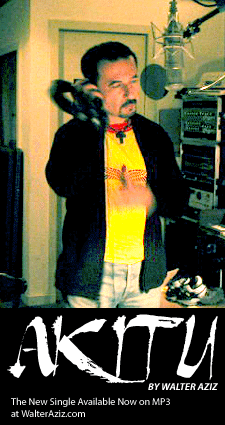 |
Everybody is waiting to see these reforms, in the structure of the regime and in the society, even factions in the Baath ruling party and in the other Front parties are keen on seeing theses changes. Everybody acknowledges the prevalence of widespread corruption and a chronic crisis and further, the great need for reforms, yet everyone has his own assessment and views depending on his ideology as regards these reforms. We, in ADO, see that this crisis is the natural offspring of the totalitarian regime itself, which has ruled Syria since Al-Baath party took over the power, and even before that since the union between Syria and Egypt. This was the case with all the totalitarian regimes that have ruled more than half of the countries of this globe for about half a century, these regimes, some international some national others religious, have failed to achieve freedom, prosperity, justice and equality for their people, and the failure was not only due to the mistakes of the absolute ruler or the leadership but also was inherent in these regimes, that have produced replicas of themselves, generated corruption everywhere and dehumanized the people.
From the ongoing debate in the political arena among some political factions, we notice that they differ on the distant goals, which are the principal ones, whereas they agree upon one thing, which is, the necessity for change defined as "reform ". This is considered a short-term and temporary consensus and alignment which actually contains the seeds of disagreement and dissension about the nature of the new system and constitution. Many political parties, nationalist, religious or Marxists, are still clinging to their totalitarian programs but agree upon the necessity for reforms as a temporary tactic. In our opinion, this in not the aim that the Syrian people wishes to accomplish or at least what the democratic forces want.
Our organization has put forward its vision of the political and social system since its inception in 1957, that is the establishment of “a democratic, multiple and secular system based on the principles of justice, equality and human rights including the rights of minorities within the context of the unity of state and society. Full equality of women with men. Recognition of Assyrian Syriac people and the Syriac culture and language as a national original status “. In addition to rejecting all forms of violence, and the use of peaceful, civilized and democratic means to reach the ends.
Our own concept of democracy is a clear cut one, we believe in the same democracy now applied in the northern hemisphere, we see in it the system that guarantees rotation of power peacefully according to the will of people and the ballot boxes. We see in it the separation of authorities, the supremacy of law, the neutrality of army, the separation between religion and politics not society, and further, a place where all citizens are equal before the law, a place where people wish to live in peace and reject all calls for wars. In short, we see in it a real democratic constitution, far from all artificial or ideological terms.
As regards our vision on the possibility of democratic change in Syria, we think it is possible. Syrians are civilized and open people and had experienced democracy in the fifties. But a sudden and speedy transition to democracy after years of totalitarianism and despotism may create chaos and anarchy. In our current situation the secular democratic forces are weak, unprepared, while the ready alternative is the fanatical and religious forces. Hence we see the importance of gradual transformation to democracy. But this should not be interpreted as delaying the reforms, this is usually the pretext cited by the authorities for delaying reforms, but we think there is really great hazard in taking speedy uncalculated steps. Hence owing to the gravity of the moment, the regime bears historic responsibility in this transition period, and we further avail ourselves of this opportunity to call upon the president to personally adopt and take charge of this reform process and all the democratic forces in the country would be on his side, fully supporting him. We feel that time is ripe for this transformation provided that there is political will and determination for that.
But in case there is no response on the part of the authorities, the patriotic forces have no choice but to take the initiative and call for the convening of a general conference in order to set out their common vision for reforms and program for a peaceful democratic change in the country.
We further believe that the real introduction to the supposed reform process should be based on the following:
- Revoking emergency and martial laws.
- Revoking all exceptional courts, such as State Security Court, and the rulings passed by them.
- Releasing from prison all the political detainees and prisoners of conscious, and closing once and for all the file of political detention.
- Issuing a modern democratic law, concerning the political parties, that would take into consideration the cultural, political and ethnic diversity in Syria, as well as a modern law for elections that would guaranty a true representation for all components of the Syrian society.
- Granting citizenship to all those stripped of it, especially to our Kurd brothers due to the 1962 census
- Acknowledging the ChaldoAssyrian Syriacs as an original people in Syria and the Syriac culture and language as an original national one that should be revived and protected
- To consider Syria as a permanent home for all its sons and the Syrian identity with all its civilized, cultural, religious and national diversity as one last, unifying and national identity.
- The agreement upon the constitution starts firstly, with the cancellation of article eight stipulating the monopoly of power by the Baath party. Secondly, the cancellation of article three about the religion of the head of state as a step for separation between religion and politics.
- To consider the declaration of human rights and the other relevant international conventions a part of the constitution and the new national bond as regards individual freedoms, equality between man and woman and minority rights within the context of the unity of sate.
- Keeping the army away from politics and neutralize it, the army’s duty should be to protect and defend the country.
- To draw a comprehensive plan for administrative, economic, educational and media reform and to combat corruption by treating its causes.
Saadi's Presentation in Damascus on Reforms in Syria
 Zinda: The following is the full text of the presentation delivered by Mr. Bachir Isaac Saadi in Damascus, Syria on the political reforms in that country. The presentation was made on 7 May at the Jamal al-Atasy Forum.
Zinda: The following is the full text of the presentation delivered by Mr. Bachir Isaac Saadi in Damascus, Syria on the political reforms in that country. The presentation was made on 7 May at the Jamal al-Atasy Forum.
In the beginning I would like to thank Jamal Al-Atasy forum for inviting us to this patriotic democratic meeting which is considered really a step in the right direction toward achieving a democratic future for our people.
Introduction
In the past years, an ongoing debate and dialogue have been going on in Syrian amongst different political cultural and economic organizations on the problems of (change and reform ), issues which have become pressing in the Syrian society. These organizations have been striving to put forward their reform programs and prospects of desired changes in this phase. This round-table discussion that combines us as patriotic political powers in Syria comes as an important step towards practicing and reinforcing the democratic process in the direction of reform and change.
To put this debate on the right truck and obtain the best desired benefit from it, we think that the history of Syria should be read from a different prospective, based on objectivity rather than on outdated narrow nationalistic, religious and fanatical ideologies or prejudice. The truth is that the Syrian history has not started with the Arabs. The civilization of this county is richer and more diverse than to be attributed to one people to the exclusion of the others, it is the product of efforts of many ethnicities and people who have lived here throughout history. In this context, we think it is wrong to view the concept of the (national identity ) of the Syrian state as something fully accomplished and to further consider (Pan-Arabism and Islam ) the only undisputed identity for the Syrian society which is characterized by cultural, linguistic and religious diversity. In Syria nowadays, live other nationalities whose existence predated the Arabs themselves, such as the Assyrians (Syriacs and Chaldeans ), who have given their name to Syria, as well as Kurds, Armenians, Turkmen and Chichans, each of these have their own culture and constitute an original component of the Syrian national fabric.
As a matter of fact, there is a deep rift and schism in the national bond among various factions of the Syrian society. The diversity of our society, instead of becoming a source of national wealth and richness, has become a destabilizing factor that has put our national unity in jeopardy, due to chauvinist policies of the dominating Arab nationalists and the cultural, political and nationalistic despotism practiced against the other nationalities.
To rectify these drawbacks and to heal the lack of integration in the society and further to consolidate the national unity, it is necessary to redefine and to reformulate the concept of the cultural identity of Syria, so that it would become a national harmonious identity reflecting and expressing all the colors - cultural, social and religious –of Syria's spectrum. We are fully confident, that such steps, would reinforce national unity and further ward off ethnic and sectarian conflicts the likes of which have become widespread in Iraq. Moreover, it is obvious to everybody that the cultural, ethnic, religious and social structure of the Syrian society is very much similar to that of Iraq, so, no sane person wishes to see in Syria what has happened in Iraq. Hence, It is about time, that everybody renounced his nationalistic sectarian plans for the sake of the (national state), a condition which rises above other narrow ideologies and dogmas, and makes Syria a permanent home for all its sons, a place where all nationalities would assimilate voluntarily not forcibly, a place for democracy, human rights and citizenship without distinction of race, religion or political orientation.
Steps of Reform
No doubt, there are a lot of questions to be answered, but we think the best thing to start with is diagnosing the crisis, defining the causes and then moving on to confront them with transparency and high responsibility. This, on the other hand, makes incumbent upon the state to open up on the various active forces in the society and involve them in the discussions and the process of finding solutions for the crisis through a comprehensive national dialogue and a common, agreed upon program for reform, as no party whether in the opposition or the Front claims to have a magic wand or ready solution for the country's problems.
Next Issue:
Announcing Zinda Magazine's Assyrian Person & Event of the Year 5754
Don't Miss It !
|
The second step starts with the political reform which we believe is a key solution for the other problems economic, administrative, educational, cultural and social. Any delay in implementing this reform on the pretext that priority should be given to others is very much like putting the cart in front of the horses. Moreover, we would like to stress here on the option of the gradual reforms, past experiences have shown the failure of revolutionary or military coups, and the clearest example is the case of the Syrian people which is still paying the price of the chauvinistic policy practiced by the Baath party since the coup of 1963 that brought him to power, Added to this, we sense an increasing tendency among the Syrian people for democratic changes, political reform and rotation of power through gradual transformation from within and with participation of all patriotic forces in the country.
The fundamental step in political reform lies in drafting a new constitution based on the principles of secularism, democracy, human rights and separation between religion and state. A constitution that would express true citizenship and partnership in the country. A constitution that would end the monopoly of the Baath party and would provide equal opportunities for everybody to assume power constitutionally, and acknowledge the cultural, linguistic, ethnic and religious diversity of Syrian society. A constitution that would be free from clauses and articles -that breed segregation, racial and religious discrimination – like article 3, clause 1 that says " the religion of the head of state is Islam ", clause 2 of the same article " Islamic jurisprudence is the principle source of legislation", and clause 3 "al-Baaath party is the leader of the state and society”. What democracy or national unity can come from a constitution that racially and politically segregates its people ? Ignoring fundamental issues such as these which are part and parcel of the democratic process, would let us fall in the pitfalls of theory and practice, contradiction and opposition between demanding democracy and practicing it on the ground.
The Syrian people, no doubt, live mixed feeling of confusion, despair and political frustration nowadays, seeing their country at a crossroad, and knowing well the state of separation and weakness the liberal and secular forces –which constitute the Syrian opposition - are suffering from. Moreover, the forces opposing to any change and reform in the country are still in control of the state and society. Needless to say, these forces are not going to surrender their privileges easily but on the contrary they are going to fight till the last. In spite of that, we are fully confident that reform and modernization of the country is still possible provided that certain conditions are met. The foremost being, the readiness of authorities for reform and the relinquishment of their disposition for monopoly and power. In this regard, much hope is placed on the democratic and active trends in the Baath party itself, the existence of such a democratic Baathist trend is very important for a real, healthy and non-violent democratic transformation in Syria.
As a matter of fact, laws alone can not reform societies or bring democracy. Democracy is built throughout a continuous sequence of cultural social and historical growth, it is a gain obtained through struggle and sacrifice, it is not bestowed upon people via presidential decrees or a governing -party resolutions. Nevertheless, the importance of modern and contemporary laws should not be belittled, these laws free the active forces and the civil right organizations such as (parties, media, economy, education, organizations ) from the despotism of the state.
We think achieving all these goals depend on :
- Revoking emergency and martial laws.
- Revoking all exceptional courts, such as State Security Court and the rulings passed by them.
- Releasing from prison all the political detainees and prisoners of conscious, and closing once and for all the file of political detention.
- Granting citizenship to all those stripped of it - especially to our Kurd brothers- due to the 1962 census and allowing all the political exiles to return to the country.
- Issuing a modern democratic law, concerning the parties, that would take into consideration the cultural, political and ethnic diversity in Syria.
- Issuing a democratic modern law for legislative and regional elections that would guaranty a true representation for all components of Syrian society.
- Acknowledging the ChaldoAssyrian Syriacs as an original people in Syria and the Syriac culture and language as an original national one that should be revived and protected.
- Passing new laws that would protect society from religious and nationalistic fanaticism and segregation.
- Working out secular plans based on democracy and human rights for educating the youth at schools.
- The constitution should preserve the political and cultural rights of all the minorities in Syria.
- Full equality between man an woman and the elimination of all forms of segregation.
- The reform should involve all aspects of life, political, economic, social educational, administrative and judicial as well as combating corruption by treating the causes.
- Independence of judiciary and separation between the judiciary, executive and the administrative authorities.
- Keeping the army away from politics and neutralize it, the army’s duty should be to protect and defend the country.
No doubt, the regime bears the greatest responsibility for the economic crisis in Syria and for the deteriorating living, educational, cultural and scientific conditions. Corruption in all state agencies and sectors is widespread, and the utilization and distribution of the country's wealth is terrible. One of the big questions frequently asked in this regard is the following: What kind of a development plan is able to take in 200.000 persons thrown every year into the labor market in Syria due to the very high rate of population growth ??!! For sure this will lead up to a greater unemployment, poverty and will have very bad consequences on the future of the country. But on the other hand, these problems also have deeply rooted historical causes, related to the cultural and social heritage, added to this, the ignorance and backwardness inherent in the society. These very serious issues should be tackled transparently and boldly. If there is no limit to the terrible population growth rate, and no laws controlling the high birth-rate and ridding women of oppression and slavery, there will be no glimpse of light at the end of the tunnel.
On the level of foreign relations, it is very important that Syria establishes best relations with the neighboring Arab and non-Arab countries, relations based on cooperation, friendship, mutual respect and common interests.
Thanks for your listening.
Lebanese Christian Groups Gather to Reject Electoral Law
Courtesy of the Daily Star
14 May 2005
By Raed El Rafei
(ZNDA: Beirut) To assert their total rejection of the "unfair" 2000 electoral law, representatives of the Lebanese Christian parties and movements as well as prominent Christian Beiruti personalities gathered at the Gabriel Hotel in Ashrafieh last Friday.
This event was an opportunity for right-wing Christian groups to freely speak out after the withdrawal of the Syrian army and secret services from Lebanon.
"The aim of this meeting is to express our full support for the Maronite Bishops' Council and Cardinal Nasrallah Sfeir who are fighting for the rights of the Christians in Lebanon," said the coordinator of the meeting Rami Chidiac, a member of the outlawed party Guardians of the Cedars.
In a final statement, Mr. Habib Efram, president of the Syriac Union and secretary general of Christian Lebanese Unions, called for a "technical delay in the parliamentary elections, scheduled to begin at the end of this month, until agreement on a just electoral framework is reached."
The meeting also ended attempts of "setting up consensual electoral lists and creating alliances as a way to undermine the misbalance of the current electoral law." The participants insisted instead on passing a new electoral law to give all Lebanese groups fair chances during the elections.
Addressing the international monitors of the upcoming elections representing the European Union and the UN, the statement also stressed that real democracy can only be guaranteed by a law truly representing the Lebanese will. This closing came as criticism to recent calls from the international community that elections be held on time under any circumstances.
During the meeting speakers expressed their frustration with respect to the current political situation.
Maroun Abu Rjaili, head of the Roman Catholic Union, slammed opposition leaders for "abandoning their declared principles in favor of narrow personal interests linked to the elections." He added that, "the present law marginalizes the Christians in Lebanon and thus, is in total discord with the spirit of the Taif Accords."
Nabil Meshantaf, president of the Lebanese Movement Party, reminded the audience that "late former Prime Minister Rafik Hariri had agreed on the electoral law of 1960 which is based on small districts (qada) because it guarantees national unity."
David Issa criticized opposition figure Saad Hariri for his latest positions and urged him to have "a clear stance towards the Christian community which supported him and his family after the assassination of his father, Rafik Hariri".
Protesting against the present political system, meeting attendee Iyad Bustani called for the creation "of a federation in Lebanon, following the Belgian model for example, so that each confessional group can elect its representatives."
Romantic Comedy “Cousins” Mainstream Crossover for Assyrian Producers
Courtesy of RealChicago.com
18 May 2005
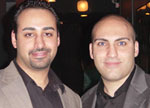 |
| Strategic Entertainment partners Martin Khoshaba (left) and Billy Haido |
(ZNDA: Chicago) Assyrian-language film producers Strategic Entertainment take a step toward the mainstream market with the production of “Cousins,” their new mixed Assyrian- and English-language romantic comedy.
“Cousins” marks Strategic Entertainment’s first effort to reach audiences beyond its core ethnic constituency. It’s the company’s first feature with a significant portion in English, and the first that will feature English subtitles for the Assyrian dialogue.
“We might do three to five more Assyrian films and then go mainstream,” said writer-director Martin Khoshaba.
Crystal Dinha (“Las Vegas”) and Jacob Alexander (“Poetic Emancipation”) star as a young couple in love but kept apart by class differences.
“The story really targets the younger crowd but the older crowd will love it just as much,” Khoshaba said. “I’ve always been a firm believer that parents shouldn’t step in their children’s way when they really like someone because the boy or girl they like are not as fortunate as they are.”
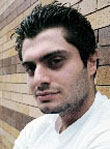 |
| Jacob Alexander stars in “Cousins” |
“Cousins” also features Abbee Sarkis and Hani Nuri. Executive producer is Billy Haido, Khoshaba’s partner in Strategic Entertainment.
Producers are Ron Rehana of Hal-a-Bat Films and H. Adoni Esho of CampaCinema. Esho and Rehana were director and producer, respectively, of last year’s Assyrian- and English-language drama “Poetic Emancipation.” Assistant producer is Jeremy Mangin.
“Cousins” shoots for 23 days in June on DV on a $75,000 to $100,000 budget. Principal photography is in Chicago, with additional shooting in Detroit.
Through Strategic Entertainment, Khoshaba directed the 2003 comedy “Akh Min Khimyani,” which he bills as the first Assyrian-language film ever produced in the U.S., and the 2004 drama “Cost of Happiness.”
He plans to follow the same self-distribution model for “Cousins” that he employed on his two prior pictures: premiering here, touring the picture to Assyrian communities in California, Arizona, Michigan, Europe and Australia, then releasing it on DVD.
To learn more about the past and current Strategic Entertainment projects click here.
City of San Jose Commends Assyrian Student
(ZNDA: San Jose) On 17 May, the office of San Jose, California Councilmember Nancy Pyle issued a statement of commendation for Ms. Ashoorina Youabb, a San Jose resident, for her exemplary work in assisting a young family struggling to leave gang life.
Ashoorina Youabb is a student from California State University at Hayward interning with the Victim Witness Assistance Center, to help crime victims through public policy.
From the streets to the classroom, Officer Barreto continues to demonstrate a passionate desire to educate persons on the hazards of gang life not only for the gang members themselves but also for their families as well as the professional people that work with juveniles and young adults involved in that lifestyle.
Ashoorina worked with Cesar Sanchez, or “Grifo”—the name by which the Violent Crime Enforcement Team members knew him, a “hardcore” Sureno gang member. Working with another San Jose police officer, Joaquin Barreto, Mr. Sanchez was convinced to get out of the violent street gang that he had known for so many years, and was assisted with future career plans and referrals to get family assistance. Mr. Sanchez had spent nearly half of his life in a gang. Through her deep-caring sensitivity and warmth, Ashoorina developed a trusting relationship with his young family consisting of his young wife named Carmen Sanchez and their 2-year old daughter —Diane.
Ashoorina’s relationship with Cesar Sanchez ended on March 7, 2005, the day that he was fatally shot in front of his home in San Jose, yet she continues her work as a victim advocate with both exuberance and her belief in the restoration of the human spirit. Ashoorina now advocates in Cesar’s name, beginning with having ensured that his wife and child move to a safer home.
The official commendation notes that Ms. Youabb is an exemplary role model inspiring her colleagues and community to serve others and create a healthy environment in the city of San Jose where all children and families can thrive.
The following is a San Jose Mercury News article published on 17 April 2005 by Julia Prodis Sulek detailing the life of Mr. Sanchez and the assistance he received from Ms. Youabb and Officer Baretto.
Courtesy of San Jose Mercury News
17 April 2005
By Julia Prodis Sulek
Ashoorina Youabb got the call while she was driving. ``Pull over real quick,'' said her supervisor at the Victim Witness Assistance Center.
Cesar Sanchez was dead. Shot in the head, left in a puddle of blood on his front porch, held by his wife with their 2-year-old daughter at their side as he died.
For 10 seconds, Youabb couldn't speak.
This was the guy, just 22, who had renounced his own gang to be a husband, father and role model. Youabb was a college intern, just 24, helping him find a home away from the gangs that plagued his San Jose neighborhood near Willow Street and Highway 87. If only she had worked faster, she thought, maybe this wouldn't have happened. She cried and cried, then made the next call.
``I'm sorry, I have to tell you something.'' She explained to Joaquin Barreto, a San Jose police officer in the gang division, what happened.
``Are you serious?'' Barreto asked, his voice cracking. ``I can't believe it. Man, I can't believe it.''
Cesar Sanchez had been Barreto's success story -- a tattooed homeboy with a shaved head and a low-rider Buick Regal whom Barreto had mentored for five years and finally convinced to get out of the gang.
His death was the fourth of six gang-related killings in San Jose so far this year -- a number already surpassing the total from all of last year. And even with all the efforts across the city confronting the gang problem, Barreto knew that solutions come one kid at a time.
Sanchez was just one. But unlike so many others who just talk about getting out of the gang, Sanchez actually had the courage to endure a ``jumping out'' ritual -- a severe beating by his old gang friends to earn his freedom and restart his life.
``I want a better life for me and my family,'' Sanchez told Barreto. ``I don't want to die in gang violence.''
Barreto made him a promise: ``I will work with you. I will help you.''
On the evening of March 7 -- less than three months after he was jumped out
-- Sanchez was gunned down in gang violence anyway. A 16-year-old from a rival gang who barely knew a thing about him was arrested.
Now, more than a month after his death, Sanchez's 20-year-old wife, Carmen, is trying to be strong for her daughter and to calm her three younger brothers who looked up to him like a father and are angry now. She's trying to remember the good things, trying not to hate.
And the two civil servants -- the committed gang unit cop who believed he had made a difference, and the idealistic intern working for free on her very first case -- are left searching for meaning in his death. At the same time, they can't help but contemplate the irony of the killing and the futility of their work.
``It's making it hard for me to say with a straight face, `Hey, I can help you,' '' Barreto said.
Youabb's supervisor, Margaret Petros, was worried about her new intern, too.
The California State University-Hayward student, who grew up in a close-knit family in San Jose's Almaden area, had so much promise. Would a tragedy like this turn her away from victims advocacy? Petros' concern was real: Her last protege had done just that.
Barreto wasn't one to be easily moved. He was 37 and cynical. He had already seen ``the worst of the worst'' in his life. As an Army soldier, he had witnessed the carnage of the Persian Gulf War. His sister died of breast cancer, his brother in a car crash. Now his mother was seriously ill.
Barreto hadn't married. People close to him die.
He met Cesar Sanchez five years ago when he was breaking up a gang fight near McKee Road in East San Jose. Aside from the Sharks hockey team logo tattooed across the back of his shaved head, the only things that distinguished Sanchez from the rest of the group in blue jerseys were the hearing aid he had worn since childhood and the speech impediment that went with it.
Sanchez was 17 at the time and had been in the Sureño gang since he was 12.
His homeboys called him ``Grifo,'' a nickname meaning ``Partier.''
Like Sanchez, who was being raised by his grandmother, most of the kids out there that night were dropouts from broken homes. Gangs filled a void. Life without them was a hard sell.
But there was something unusual about Cesar Sanchez that made Barreto think he could be reached. Unlike the others, he didn't run and he didn't lie.
``He had a real good manner of communication with police -- respectful and very honest,'' Barreto said. ``I kept it in my mind that this was someone who wouldn't follow this path if he had the same opportunities other kids have.''
Nonetheless, over the next few years, Sanchez racked up a string of gang-related arrests, from an assault that was never prosecuted to a narcotic influence charge that was dismissed after he went through a drug program.
Barreto often ran into him when responding to gang disturbances.
``Hey Grifo, what's up?'' Barreto would ask.
Sanchez was married now, he told Barreto two years ago, had a child. But the gang was still family.
``What are you doing wasting your life? When you go to prison, your homies don't support you,'' Barreto would tell him. ``It's time you got out.''
But Barreto knew the gang code: blood in, blood out. Like a fraternity hazing ritual, gangs ``jump in'' new members with a beating. When one wants out, the ``jumping out'' is far worse.
In all Barreto's years on the force, he didn't know a single person who had the guts to be jumped out. Most just moved away, faded out.
But Barreto saw something changing in Sanchez. Not on the outside. But the inside.
BET-EIL
ASSYRIAN CHURCH
"Silent Auction"
&
Assyrian Folkloric Music Concert
June 4, 2005
7:00 PM
Los Gatos Christian Church
16845 Hicks Road
Los Gatos, CA 95032
Donation: $20 Contact Helda Khangaldy (408) 421-2492 |
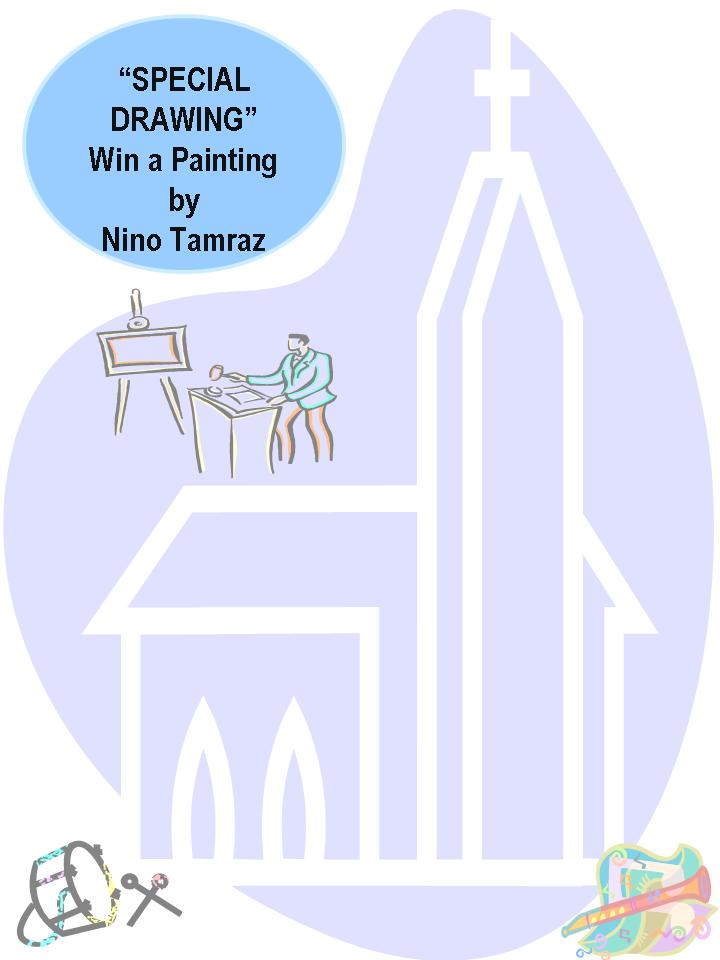 |
He saw it one night last year when he pulled Sanchez over on Santa Clara Street downtown. The gold Regal was easy to spot. Sanchez was in front and three boys -- barely teens -- were in the back. Like Sanchez, they were decked out in their gang colors.
Not much surprised Barreto anymore. But that night, Cesar Sanchez did.
With his baggy pants slung low, Sanchez got out of the car and whispered this to Barreto: ``Can you pull these kids out of my car and put them in the police car and scare them? Talk to them. Tell them what you told me.''
At home, Sanchez started talking to his wife, Carmen, about Joaquin Barreto, a man he considered a ``father figure,'' who was encouraging him to leave the gang, maybe become a youth counselor.
It made Carmen nervous. Being a gang girlfriend and wife was all she knew.
She was 15, he was 17 when they met at the Gallo Colorado shopping center on McLaughlin Avenue. Police had just confiscated Sanchez's car because he had no driver's license. So he was on foot, ``kickin' it'' with his friends.
``He said he was happy they took it away or he couldn't have met me,''
Carmen said. He was romantic, and funny like that.
Two years ago, when she had their baby, Diane, they married. They would be together, Sanchez told his wife, until they were ``old and rusty.''
He moved in with Carmen's mother, uncle, cousin and her three younger brothers, who were 13, 12 and 10. They were about the same age as Sanchez was when he descended into gang life.
His grandmother did her best raising him on the East Side. But he slipped nonetheless, and chronicled it in a journal he kept called ``My School Years.'' In kindergarten, ``Three Little Pigs'' was his favorite story. In third grade, he liked history and science and playing Pop Warner football.
By eighth grade, he considered himself a ``low life trying to survive.''
Favorite class? ``Nothing at all.''
Greatest moment of the year? ``1996 Valentines Day, tha bomb. Riot.
Suspended 5 days.''
Sanchez didn't want his daughter or his wife's brothers following a similar path.
Last year, he moved the extended family out of the East Side to Willow Street in central San Jose.
At least the distance would put some separation between him and his Sureño homies. The Craftsman-style house with the white picket fence was only a few blocks from the affluent Willow Glen neighborhood. But it was also on the edge of the oldest San Jose stronghold of the Norteños -- the Sureños fiercest rivals.
Sanchez worked as a welder by day and took classes at night to earn the equivalent of a high school diploma. He started reading the Bible. Each night, he would light a candle and tell stories to his round-faced daughter about Jesus and the Virgin Mary.
He would gather Carmen's three brothers and their two friends to the living room or the brown vinyl couch on the front porch. He lectured them about the pitfalls of gangs. How once you get in, it's not easy to get out.
They looked out on Willow Street, a busy thoroughfare. With a liquor store just a few doors down, Norteños would walk by sometimes, slowly. There was an assumption on the streets that if you weren't a Norteño, you must be a Sureño. Once, the house was pelted with empty bottles.
``I used to want to be a Sureño. But he told me not to,'' said Carmen's 15-year-old brother, whom the Mercury News is not naming for his safety.
``He used to talk about it was stupid. That you could get killed by nothing.
You don't get nothing.''
Sanchez taught them one other thing: It doesn't matter what you look like on the outside. It's what's inside that counts.
It was his only bad advice.
In late December, Sanchez knew it was time. He was ready to be ``jumped out,'' and endure the beating that came with it.
Thirteen of his friends, some whom he had known for more than 10 years, met him at a park near McKee Road. They kicked him like a rag doll, hard, in his back and head. When it was over, Sanchez could barely walk. His head was pounding, ringing even.
``Rang my bells 4xs,'' Sanchez wrote on his calendar that day.
He called officer Barreto, who greeted him with his usual ``Hey, Grifo.''
``Don't call me Grifo,'' Sanchez said.
He had been jumped out. He was Cesar now.
Barreto, who is usually reserved about his work, was so proud about Sanchez leaving the gang that he told his colleagues. Few believed him. They'd heard it so many times.
``But no,'' Barreto said. ``He's really out.''
Barreto made good on his promise to help Sanchez and sent him down to the county's Victim Witness Assistance Center on North First Street. There, Sanchez could get financial help to relocate his family to a safer neighborhood. Ever since the jumping out, his house had become a target for late-night harassment and thievery -- odd knocks on the door at 3 a.m., bikes stolen from the yard.
His case was assigned to intern Ashoorina Youabb, an energetic political science major who had dreams of helping crime victims through public policy one day. She was drawn to volunteering at the agency by her aunt Margaret Petros, who had been a role model for Youabb as a child in their extended Assyrian family. Petros was now her supervisor.
But Youabb had never met a real crime victim before, much less someone who had spent nearly half his life in a gang.
Her experience in helping victims was mostly limited to taking in lost dogs.
Last year, when she found a baby bird that had fallen from its nest, she named it ``Jubee'' and fed it for a week on worms she bought at Wal-Mart.
When she met Cesar Sanchez and his wife and daughter in January -- just days after her internship started -- she didn't even notice Sanchez's tattoos at first. It was his hearing aid that drew her attention. Maybe that's what made him seem so sensitive, so vulnerable.
``I felt a connection between their family and me,'' she said. ``There was somebody I wanted to help so bad.''
With Petros at her side, Youabb interviewed the couple for two hours.
Sanchez didn't want to talk at first. But his wife explained how much he had changed since he left the gang.
``He started looking at the beautiful things,'' she told the women, taking walks in the park, telling her about the butterflies he saw there.
Finally, Sanchez opened up, telling them about the beating, showing them the scars on his back. Because of his injuries, Youabb told him, he could qualify for medical, unemployment and relocation benefits.
``I don't want to take advantage of the system,'' he told them. They assured him the money from their office didn't come from taxpayers, it came from criminals paying restitution.
Barreto called frequently, checking up on the progress of his case.
Over the next couple of months, Sanchez and his family met often with Youabb. Those meetings always ended in hugs. She gave the family her private cell phone number.
``People say you can't get too personal with your work, but I couldn't help it,'' Youabb said. ``It seemed like he was trying so hard to get out of this life. And it's so hard that this is the way his life ended.''
``He's got a gun!'' one of Carmen's brothers shouted as he looked out the window. ``He's got a gun!''
Maybe it was the gold low-rider parked in the driveway, or the Sharks tattoo
-- symbols of gang life Sanchez had yet to relinquish. Maybe it was just the way Sanchez told the teenager in the red jersey walking by with his friends that evening that no, he didn't have any cigarettes.
What police know for sure is that the house had been marked months ago as a Sureño house, and, they believe, these Norteños were simply looking for trouble. The shooter had a small black handgun, wrapped in a red bandanna.
Carmen heard five shots, saw the teens running away, and rushed outside.
Her husband lay on his back on the wooden porch. He had been shot in the arm and head. His Sharks tattoo was covered in blood. In the chaos, their daughter padded to her father's side.
He tried to tell his wife something, but he couldn't get the words out. He was choking on his own blood.
``Hold on,'' Carmen said. ``Don't leave us!''
All he could do was cry.
The oldest of Carmen's brothers ran back inside. He punched a hole in the wall so hard he broke his finger.
``They never knew he was jumped out,'' he said later. ``They just thought he was still in the gang.''
Don't retaliate, Carmen told her brothers. Leave it to the justice system.
Leave it to Jesus.
``I don't want them to get hate for what happened,'' she said. ``I just tell them, Cesar would want them to graduate and be something in their lives. Do that for him. Prove something to Cesar.''
She struggled to convince herself. Her own father had been killed in Mexico when she was a child. And now her daughter would grow up without a father, too. How could she explain that? Make her understand that her father was now with God?
S O L D |
|
, Realtor600 E. Main St. #300
Turlock, CA 95380 |
|
| www.listwithtony.com |
Carmen fumbled with the words.
``Remember when Dad told you about Jesus?'' Carmen asked.
Diane pointed her little finger up to the sky.
``Yes,'' her mother said.
Her father had taught her about heaven.
When gang members die violently, most relatives tell police their loved ones had been changing their lives, trying to get out of the gang.
Carmen knew that. She also knew her husband was sincere. As if to prove it, she brought a slip of notebook paper to Youabb's office. It was a ``to do''
list her husband had written the day he died.
The printing was neat, slanted left. Instead of dots, he had drawn little circles over the ``i''s.
These were his plans for the next day -- he had written ``3/8/05'' on top -- a day he never lived to see.
1) wake up early!!
2) go to victim witness program.
3) take family out to eat.
4) look for job & call about appli.
5) talk to wife about family matters.
6) call or visite (sic) grandma.
It's a list Youabb cherishes.
``I can't stop crying over him,'' she said. ``God, I never thought a stranger could affect me in such a way.''
She didn't turn her back on victims advocacy as Petros had feared.
Instead, Youabb set out to help what was left of this family -- victims now in a new and horrible way. Carmen and little Diane needed her now.
In the past couple of weeks, Youabb helped get them into a safer place.
Carmen has asked her how to go about applying to junior colleges, about pursuing a career in criminal justice.
For Youabb, Sanchez's death killed neither her exuberance nor her innocence.
``I want to talk to a senator, ask them to regulate bullets -- make bullets cost a thousand dollars,'' she said. ``I just want to do something in his name. I don't know how to go about doing it, but I'm going to find out.''
It's more difficult for Barreto. He had worked so hard. Come so close. He had reached out, and this time someone reached back.
At the end of April, he had planned for Sanchez to take the stage with him at a child violence symposium. Barreto will take it alone, now.
Out on the streets, when Barreto talks to other gang kids about getting out, he keeps waiting for the dreaded response: ``Yeah, well, look what happened to the last guy you helped.''
But he made a promise to Carmen: ``His story will continue to be told.''
Barreto will tell it, in his gang prevention classes, at the symposium, on the streets: Gangs suck you in, spit you out and, one way or another, kill you. But also, perhaps more importantly, goodness leaves a legacy.
Barreto needs to tell it as much as others need to hear it. Because he's still a gang unit cop, reaching out. Looking for another glimmer of hope. Searching for another Cesar.
AACC of Turlock
Honors Nardine Mansoor
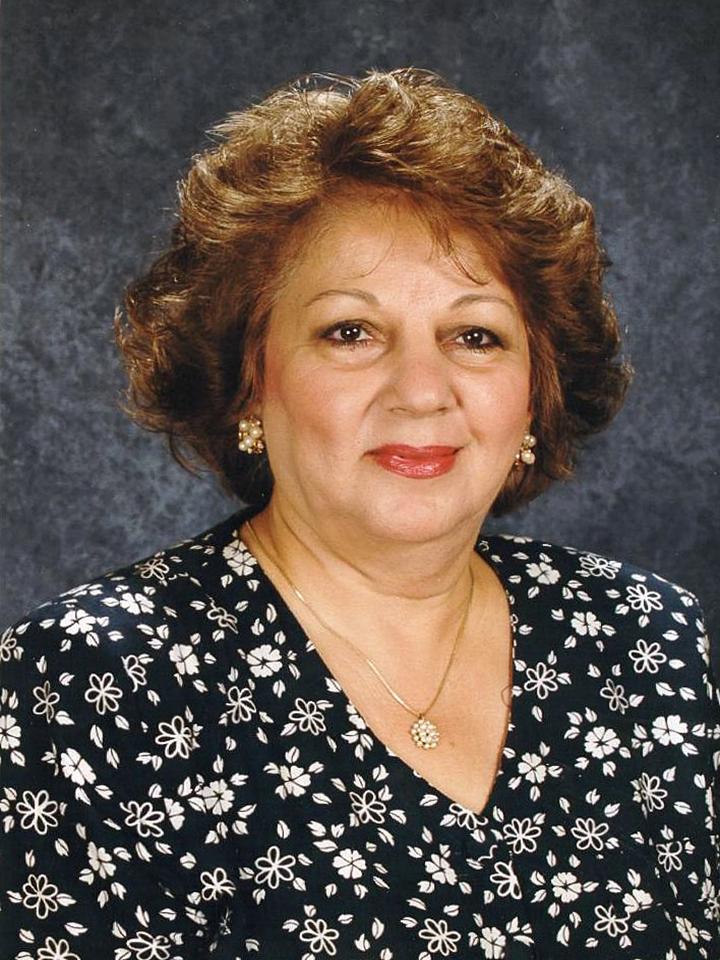 |
Mrs. Nardine Mansoor was honored last week as the 2005 Mother of the Year. |
(ZNDA: Turlock) On Friday, 6 May, the Assyrian American Civic Club of Turlock announced Nardine Mansoor as their choice for the 2005 Mother of the Year award. This annual award was established to honor one of the club’s members for her outstanding achievements in her personal and professional life. This year’s recipient definitely exemplifies the characteristics worthy of this award.
Born and raised in Abadan, Iran, Mrs. Mansoor is the daughter of Kourosh and the late Penna Varda. After graduating high school she continued her education, becoming a credentialed elementary teacher in Iran. There, she taught and enriched the lives of many children for 17 years, teaching at many schools including Tehran’s private Assyrian School, Susan. Upon her arrival to the United States, she continued her education and has worked as a Bilingual Instructional Aide for the past 25 years.
Nardine has been married for forty-one years to Walter Mansoor and she has three daughters and six grandchildren.
She has been an active member of the Assyrian American Civic Club of Turlock since 1980 serving on many executive boards, committees and auxiliaries. She currently serves as the club’s Education Committee Chairperson. She has also been an active member of Turlock’s St. John’s Assyrian Presbyterian Church. Additionally, she is currently serving her third term as the Assyrian Secretary for the Assyrian American National Federation.
In addition to all these responsibilities, her passion for the Assyrian language currently moves her to teach weekly Assyrian classes at the club. Her quest for continuing her own education has not stopped as well. She is currently taking behavioral psychology classes at Modesto Junior College.
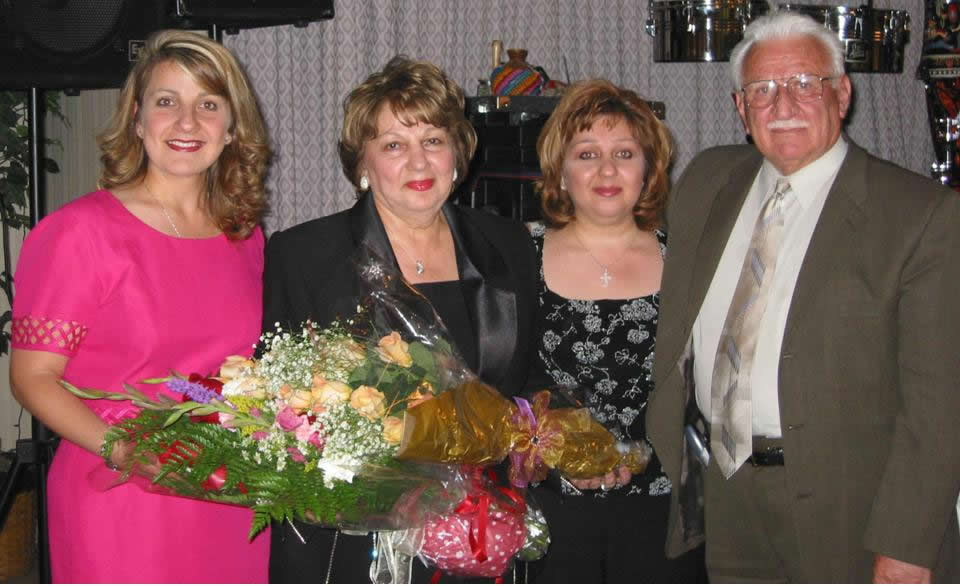 |
| Mrs. Mansoor standing next to her daughters, Belona (L) of San Jose and Edessa of Modesto, and husband, Walter. Mrs. Mansoor's oldest daughter, Arbella, is not shown here. |


